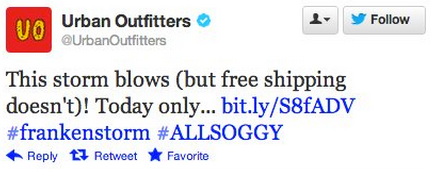The Biggest Twitter Fails of 2012

There have been some epic fails on Twitter this year proving the important point that many multinational brands are still not adept at using social media to interact with their customer base. The monumental mistakes have provided yet more evidence that social media campaigns are still in their teething stage. Please note that the crass terms, especially the ugly four letter word starting with r, you will read below are not condoned by the editors of Socialnomics, we are using these as examples of what not to do.
5. Twit-rape –
A crass term for what’s meant to be a harmless and amusing jape. When a friend or family member leaves themselves signed in to their account and some joker comes along to post an embarrassing tweet it can certainly be comical. Less so however when you do it to your own boss, as was the case with an English intern working for a local MP. In January Tom Watson, a British Labour party politician, apparently tweeted “I should log out of my twitter so my intern doesn’t twit-rape me…”
The intern soon realised her faux-pas and the tweet was deleted, not soon enough however. As is the case with social media and comical content, within minutes the tweet was retweeted and the post had travelled around the world and been seen by hundreds of thousands of people.
Tom Watson, back behind the steering wheel of his Twitter handle, posted a follow-up tweet which read; “I sincerely appoligise for the recent tweet. A lesson learned for a young intern. She’s also very sorry. I will deal with the matter offline.” Interestingly though, Tom Watson’s followers skyrocketed from the tens of thousands to well over one hundred thousand. So, in the long run, not exactly a fail.
4. #WaitroseReasons –
The first (but not the worst) misjudged hashtag in our 2012 round up. Upper echelon supermarket chain Waitrose invited their followers to Tweet under the hashtag #WaitroseReasons and to complete the sentence, “I shop at Waitrose because…” Of course, the reasons offered up by the Twitterverse weren’t always positive, often ridiculing the brand.
Arguably, however, it wasn’t a total disaster. Many online commentators believe that Waitrose knew exactly what they were doing, fully aware of the middle and upper class clientele that typically shop in their stores and rather than denounce the chain, the resulting tweets actually reinforced its posh and exclusive brand image.
3. #McDStories –
Unlike #WaitroseReasons this hashtag was a straight-up disaster. Considering the fastfood chain’s history it’s hard to believe that they honestly thought that the public would only have good things to say about the brand. The company encouraged its Twitter followers to post about their experiences with McDonalds and of course, the hashtag was immediately hijacked with people Tweeting their horror stories involving food poisoning, hospitalisation, rats, broken teeth and fingernails found in Big Macs.
This PR debacle did give rise to the term Bashtag which clearly demonstrates that social media conversations cannot be controlled and when you’re planning out your social media campaign it’s best to have a contingency if the worst case scenario plays out, which it almost always will.
Online people converse about any manner of things and on many different channels from chat specific sites to niche forums and blogs. The point is, it’s impossible to control the crowd and the discussion will flow where it wants. MacDonalds learnt this the hard way, even after they hastily pulled the hashtag it was way too late, those horror stories had been shared globally between hundreds of thousands of people.
2. Capitalising on a natural disaster –
Hurricane Sandy resulted in millions of people on America’s East Coast being made homeless and without food or power for weeks. Unfortunately some misguided retailers thought it would be acceptable to use the storm to promote their cheaper shipping rates.
Urban Outfitters, The Gap and American Apparel all revealed themselves to be opportunistic and tasteless with their insensitive promotional Tweets. Unsurprisingly this did their images no favours, especially for American Apparel who is embroiled in several well publicised legal cases. The Gap apologised profusely and deleted the incriminating post and hopefully learned a valuable lesson; the same level of humanity and social etiquette should be met online it is in real life.
1. #Susanalbumparty –
Another poorly thought through hashtag that’s undeniably hilarious. This acted as a loud and clear message to PR agencies across the world, if you’re using social media it’s sometimes worth having a dirty mind and getting your copy proofed before you commit to press.
You’d think the PR team behind Susan Boyle would know better, there have already been a plethora of unfortunate hashtags highlighting the problems that arise when you put words together. Although the hashtag was the butt of many jokes it did accrue Susan Boyle’s album even more media and public attention, so perhaps another case of failure hiding success.
[image error]








